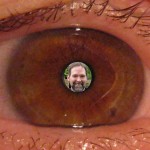A most powerful illusion
So very many of us just can't give up the idea that there is a fully functional person-like entity who operates the machinery in our brains. It's terrifying for many of us to consider that this mind, who seems to be me, has billions of thoughtless components. How is it possible for thought to be built out of non-thinking parts? I can't explain it (who can, really?), but that's how it is; it would seem that the amazing functions of modern-day computers, which are built out of numerous tiny parts, would cause many homunculus-believers to rethink  things enough that they would kick homunculi out of their lives. But most people refuse to follow the evidence because it would be inconvenient. Therefore, these homunculus-believers embrace the (powerful) illusion, which sustains the further illusion that there are souls and Gods. This is the point being made by David Weisman at Seed:
things enough that they would kick homunculi out of their lives. But most people refuse to follow the evidence because it would be inconvenient. Therefore, these homunculus-believers embrace the (powerful) illusion, which sustains the further illusion that there are souls and Gods. This is the point being made by David Weisman at Seed:
There is a common idea: because the mind seems unified, it really is. Many go only a bit further and call that unified mind a “soul.” This step, from self to soul, is an ancient assumption which now forms a bedrock in many religions: a basis for life after death, for religious morality, and a little god within us, a support for a bigger God outside us. For the believers in the soul, let’s call them soulists, the soul assumption appears to be only the smallest of steps from the existence of a unified mind. Yet the soul is a claim for which there isn’t any evidence . . . The evidence supports another view: Our brains create an illusion of unity and control where there really isn’t any.


